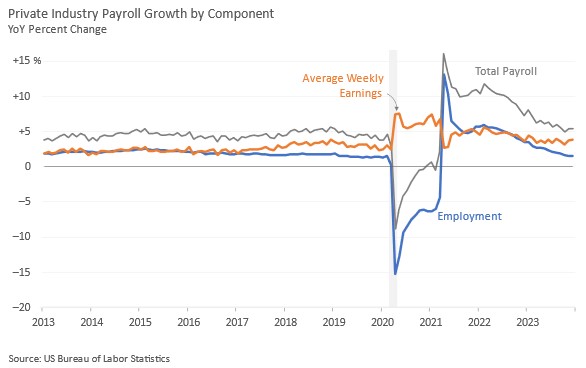Despite a "significant slowdown" in job growth in 2023, a new National Council on Compensation Insurance briefing shared that "wage growth will likely continue to drive workers compensation payroll growth throughout 2024."
"Employment gains slowed in 2023 from 2022; however overall payroll gains, a key metric for workers compensation, remained robust," the quarterly economics briefing said. "Additionally, the 2023 labor market looks solid when compared to pre-pandemic growth trends, and it appears much more 'normal' than the past few years."

NCCI's report was penned by Stephen Cooper, Patrick Coate and Yariv Fadlon.
The briefing's authors shared that while wage growth has slowed from its peak, it remains solidly above pre-pandemic growth rates and is positioned to remain elevated in 2024. The writers pointed to several factors — union activity and newly negotiated contracts, minimum wages rising in 22 states and inflation remaining top of mind for workers — that they believe will likely continue to put upward pressure on wage growth.
"At an industry level, the payroll picture looks much healthier than the employment picture," the briefing said. "Thanks primarily to continued elevation in wage growth, nearly all sectors experienced payroll growth close to or above 5% in 2023."
The Bureau of Labor Statistics reported earlier this month that payroll employment rose by 2.7 million jobs in 2023 – a number far below the 7.3 million jobs added in 2021 and the 4.8 million added in 2022. Still, in its briefing, NCCI called 2023's increase "a good gain for a 'normal' labor market." For context, in the five years prior to the beginning of the pandemic, the economy added an average of 2.3 million jobs per year.
"As we entered (or at least approached) a 'new normal' in 2023, it was natural to expect employment growth to slow back towards a steady-state pace," the briefing said. "Indeed, we expect that employment growth will continue to slow in 2024 as the labor market continues to approach a more balanced state of supply and demand. But that slowing is not necessarily a bad thing."
The quarterly briefing shared that three industry groupings — education and healthcare, leisure and hospitality services, as well as government — accounted for more than 80% of all employment gains in 2023. NCCI noted that this "appears to reflect uneven rates of recovery from the pandemic rather than a sign of serious labor market weakness."
The briefing said that at an industry level, "the payroll picture looks much healthier than the employment picture," later adding that while employment gains have slowed, stopped or reversed altogether across most industries, "these trends haven't had a material impact on the wage growth picture." The briefing's authors report that payroll growth remains broad-based, with just two lagging industry groups: retail trade and information services.
Comments
Add Comment